Roanoke City Manager Acknowledges Using AI in Writing Inaugural Speech
As AI becomes more prevalent, local governments are among the many workplaces and institutions grappling with how to regulate its use.
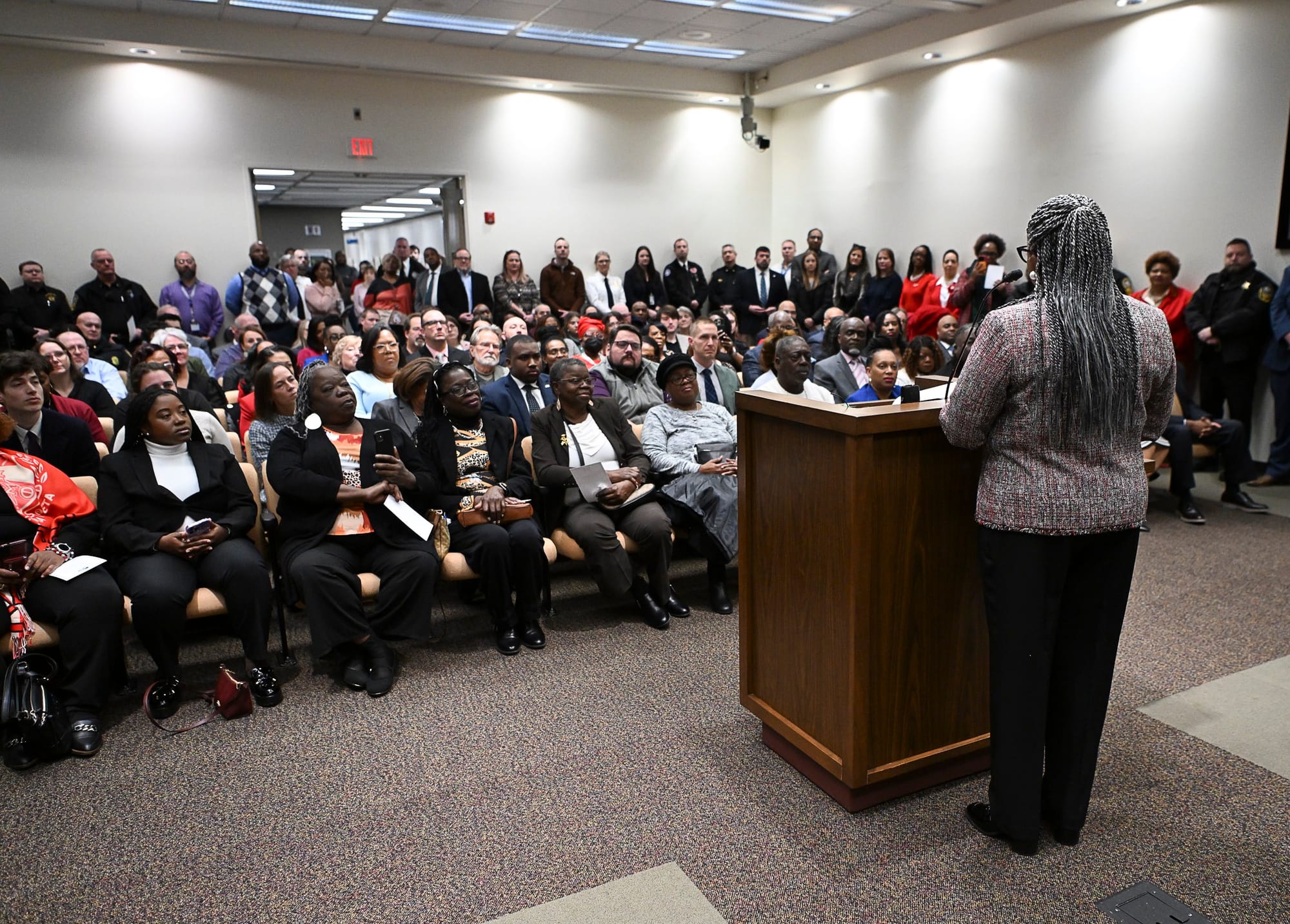
When Valmarie Turner was sworn in as Roanoke’s new city manager on Jan. 13, she thanked city staff for being “the backbone” of local government.
During a four-minute speech in front of a packed City Council chamber, Turner pledged to serve with “transparency” and “integrity.”
“Let’s get to work,” she concluded to chuckles and applause.
Such phrasing also appears in speeches generated by artificial intelligence chatbots when prompted to write a speech about becoming city manager of Roanoke. The Roanoke Rambler asked OpenAI’s ChatGPT and Anthropic’s Claude for inaugural addresses after noticing similarities in Turner’s speech and the style and structure of AI-generated prose.
Turner acknowledged using AI in drafting her speech. She did not say exactly to what extent.
“Being selected as the City Manager for Roanoke was and is an honor that I am both humbled by and grateful for,” Turner, who came from Fairfax City, said in an emailed statement to The Rambler. “I received assistance and feedback from trusted sources – multiple colleagues, family members – I trust to provide valuable feedback. AI was also used – particularly for clarity and flow.”
As AI becomes more prevalent, local governments are among the many workplaces and institutions grappling with how to regulate its use. The technology presents opportunities — including automating rote tasks, aiding in scientific discoveries and forecasting climate and weather — but also pitfalls, experts say, such as data privacy concerns, disinformation, potential job loss and environmental impacts.
Roanoke is in the process of developing an employee policy on using AI, Turner said. The city has been dipping its toes into AI recently, supporting a deputy city manager to present on AI at a tech conference last month and in April unveiling a chatbot on the city’s homepage.
Just this month, Roanoke City Public Schools updated a technology policy to encompass the use of artificial intelligence, according to district spokeswoman Claire Mitzel.
“RCPS recognizes that AI has quickly become commonplace in society and will likely continue to play a role in the future of both education and the workforce,” Mitzel said in an email. “Rather than shy away from these conversations, we believe it is important to be proactive about implementing guardrails regarding appropriate use rather than banning its use entirely.”
The policy notes staff can’t enter personally identifiable data, which would include a student’s name, into a tool like ChatGPT. The district is in the process of finalizing specific guidelines around AI, Mitzel said.
“It is clear that students across the nation are increasingly using AI, so we believe students will benefit far more from a strong foundation in media literacy and academic integrity rather than an outright ban (which can only go so far),” Mitzel wrote.
AI guidelines for local governments are scarce, but the Michigan Municipal League in September released a report with recommendations around generative AI, which can create text, images and video. It advised against creating images and video but said text generation could be helpful in summarizing documents and explaining complex topics in simple prose.
“Don’t paste confidential or sensitive information into the prompt,” the guide states. “Do disclose that the document was assisted by an AI tool.”
In Roanoke County, staff are using AI tools like ChatGPT and are developing guides around appropriate uses, according to spokeswoman Amy Whittaker.
“They’re very helpful in areas such as speechwriting, resolutions, grant writing, and polishing various types of communications,” Whittaker said in an email.
In April, the county released a chatbot through the company Citibot, branded “Ask McAfee” after McAfee Knob.
Whittaker said she even used AI to polish a section of her email about the county forming a committee to come up with recommendations around the technology’s use.
“Since your question was about AI, it only felt right to bring in my trusty ‘editorial assistant,’ ChatGPT, for a little help,” Whittaker wrote. “Seemed only fair to let the technology speak for itself!”
Salem is also currently developing policies, according to city spokesman Mike Stevens.
“The city manager’s office and our technology department are collaborating on this,” he said in an email. “Currently, and in general, we are not using AI for policy papers, speeches, and other types of writings.”
Turner, and city officials who manage media requests, did not respond to three follow-up emails about how exactly AI was used in the city manager’s speech.
The Rambler filed a records request for any documents that would shed light on prompts entered into a chatbot like ChatGPT. The city said it had no such records “as the City does not have an organizational AI platform that tracks this information at this time.”
The Rambler suspected AI could have been involved in Turner’s speech after running a transcript of the speech through several AI detection tools. Like the large language models that power ChatGPT, those detectors are a form of AI that analyzes texts based on patterns. Colleges use them to catch students cheating, though some experts say the tools are fallible.
The AI detector Winston.ai gave the text of Turner’s speech a “Human Score” of 1 percent. ZeroGPT gave the speech a 100 percent “generated by an AI/GPT” rating. Undetectable.ai gave a 74 percent “likely AI” rating, while GPTZero gave the speech only a 26 percent AI-made estimate.
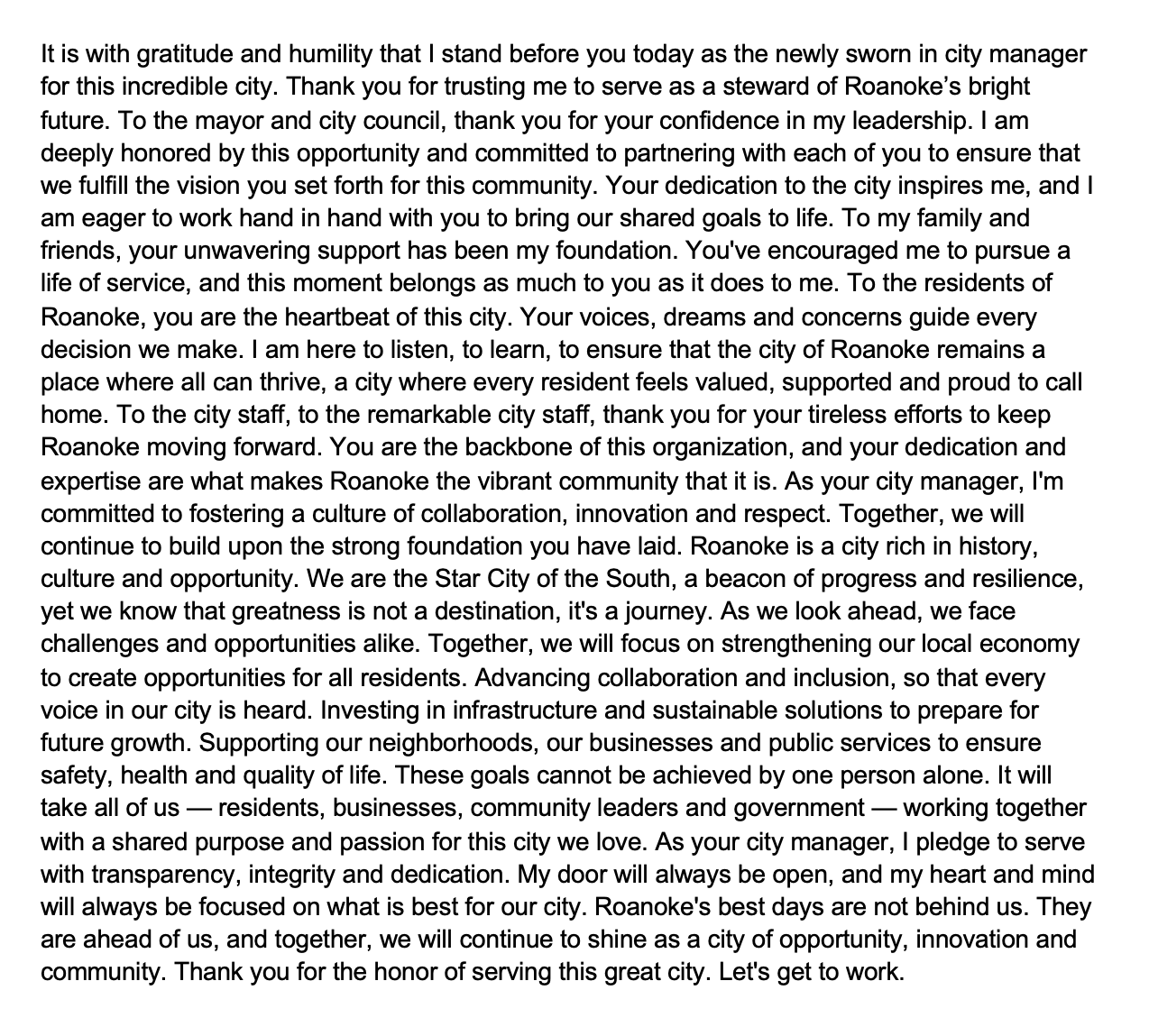
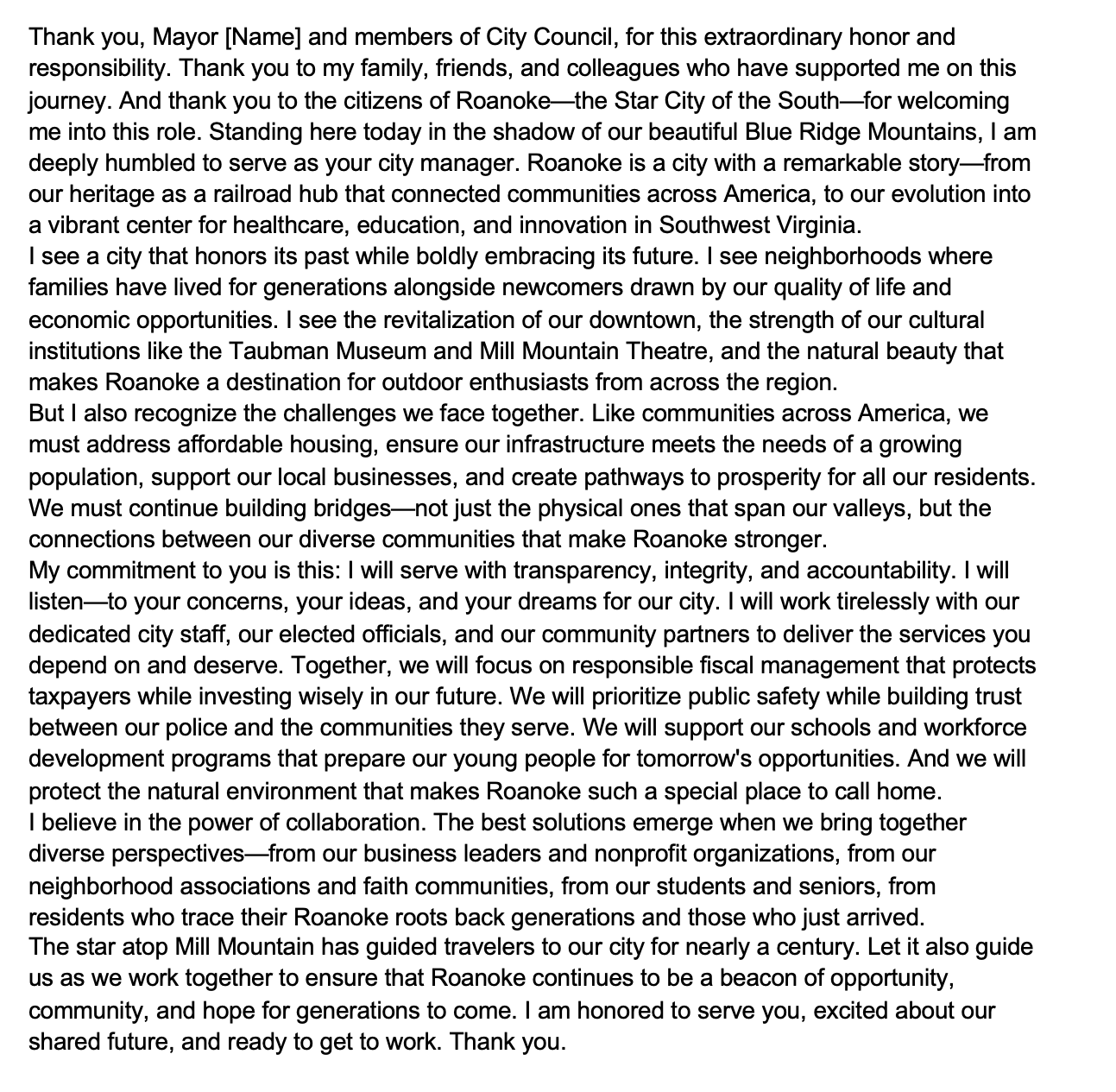
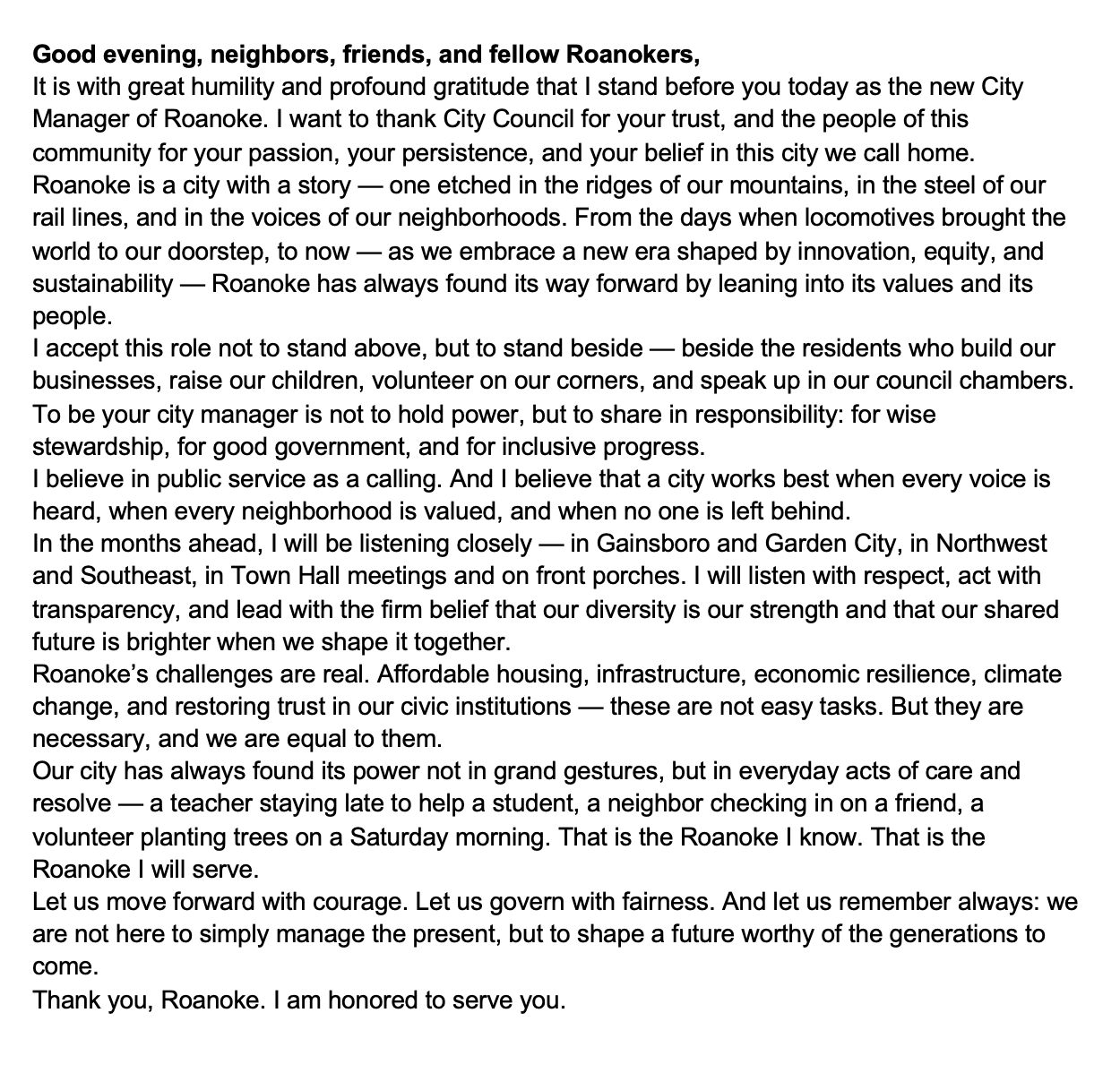
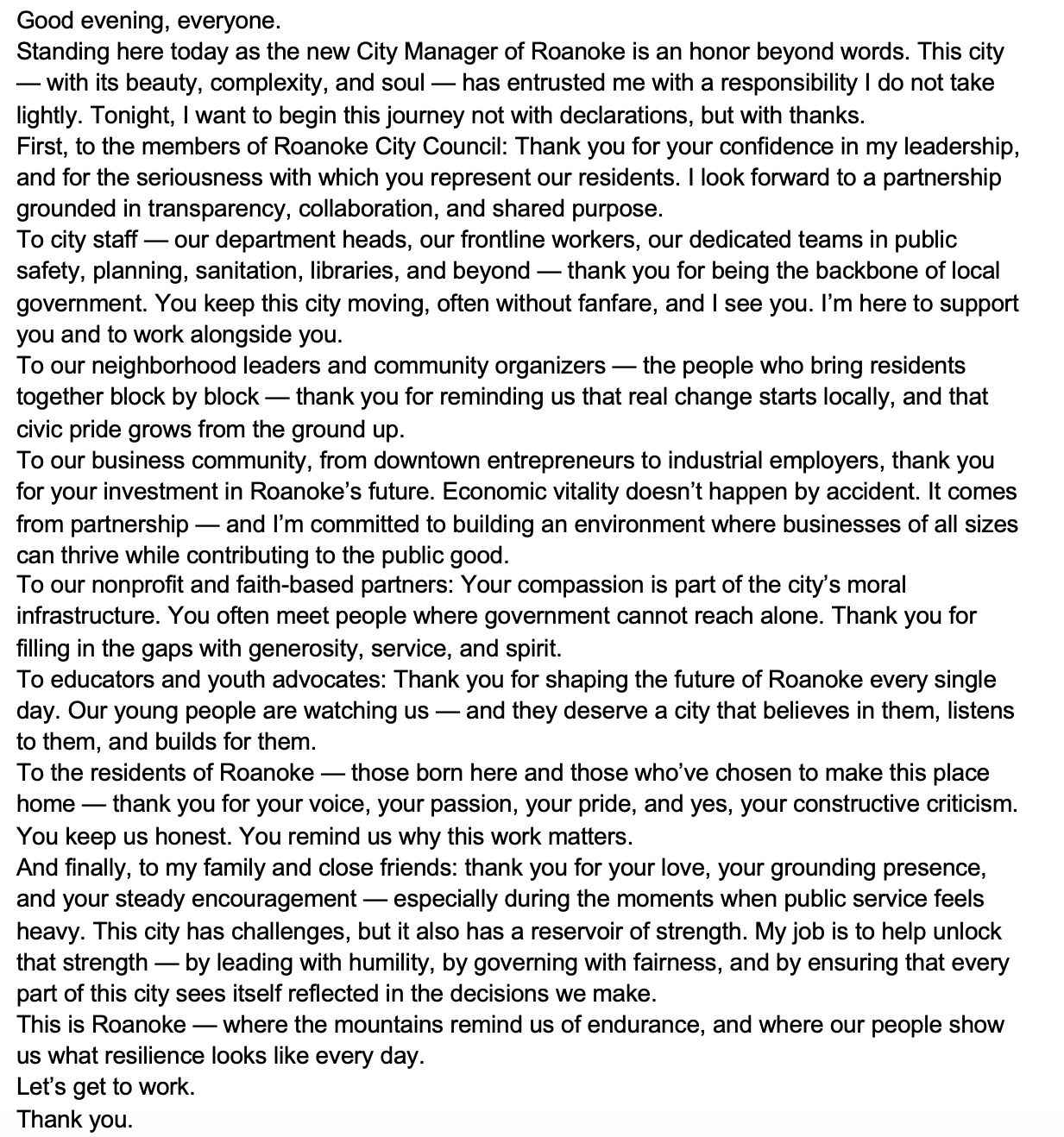
A transcript of Roanoke City Manager Valmarie Turner's inaugural speech, at top left, compared to versions created by Anthropic's Claude AI, top right, and by OpenAI's ChatGPT, bottom left and a second version bottom right, with the prompt to thank constituencies.
A comparison of Turner’s speech and versions generated by OpenAI’s ChatGPT and Anthropic’s Claude revealed similar phrases and structures.
The Rambler asked ChatGPT and Claude to “write an inaugural speech for my becoming city manager of Roanoke, Virginia” and a second version “thanking various constituencies.”
Turner opened with: “It is with gratitude and humility that I stand before you today as the newly sworn in city manager for this incredible city.” ChatGPT’s first version opted for: “It is with great humility and profound gratitude that I stand before you today as the new City Manager of Roanoke.”
Like Turner’s speech, two AI-generated speeches described city staff as the “backbone” of local government. Turner “pledged to serve with transparency, integrity and dedication.” An AI speech committed to “serve with transparency, integrity and accountability.” One sentence in the middle of a speech began, “Together, we will focus” — in Turner’s case, “on strengthening our local economy to create opportunities for all residents,” and in Claude’s case, “on responsible fiscal management that protects taxpayers while investing wisely in our future.” Turner’s speech and one by ChatGPT both ended: “Let’s get to work.”
Dan Dunlap, a visiting professor at Virginia Tech, studies the social impacts and ethics of technology including artificial intelligence.
“We have certainly become accustomed recently to running text through AI detection software, and my position from the start is, ‘Look, it doesn’t matter if you use AI to generate text or not,’” Dunlap said. “If some algorithm or AI detection system detects it was largely used, it reads as if you are writing like a robot, and that’s not good.”
“You don’t want to write like a robot, at least not in my class,” he said.
Dunlap encourages students to use generative AI “appropriately,” which he said could involve help with formatting, grammar checks and as a search engine.
“Inappropriate use is giving it a prompt, having it generate text, and then using that as your own,” Dunlap said.
Virginia Tech does not yet have an AI policy, but last academic year formed a working group to make initial recommendations, according to a university spokesman.
Dunlap said the rapidly advancing technology has made it difficult to tell how much work a student put into a paper — and how much work the machine did.
“This is a big shift in my essay assignments. It used to be, the better the prompt, the harder it was to generate a good essay,” Dunlap said. “Now, ChatGPT’s doing that work. Yikes, so what do I do now? How do I get students to do the cognitive work and ChatGPT to do the menial work?”

